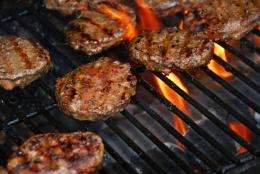Study finds red meat may increase colon polyp risk

(Medical Xpress) -- Cancer investigators from Vanderbilt-Ingram Cancer Center and the Veterans Affairs Medical Center (Tennessee Valley Health System in Nashville) have found that eating a steady diet of red or processed meat, especially meat that has been cooked at high temperatures, may increase the risk of developing colon polyps.
Polyps are small growths on the lining of the intestinal tract that may develop into cancer.
The study, led by Wei Zheng, M.D., Ph.D., chief of the Division of Epidemiology and director of the Vanderbilt Epidemiology Center, was published in the journal Cancer Prevention Research.
Patients evaluated for this research are enrolled in theTennessee Colorectal Polyp Study, a colonoscopy-based study group in Nashville. A total of 6,307 participants, ages 40-75, were included in the research, making this the largest study of its kind to date.
Participants had colonoscopies performed at Vanderbilt University Medical Center or the Veterans Affairs Medical Center between Feb.1, 2003, and March 26, 2010. As a result of the colonoscopies, 2,543 of the patients were found to have colon polyps. Another 3,764 patients without polyps served as a control group for the study.
All of the patients were interviewed shortly after the colonoscopy and completed a food frequency questionnaire to determine their typical diets, including the amount of red or processed meat they eat on a regular basis. Meats listed on the survey included fast food or home-cooked hamburgers or cheeseburgers, beef steaks, pork chops, ham steaks, bacon, sausage, hot dogs, chicken, fish, gravy from meat drippings, short ribs or spareribs.
Study participants also looked at color photographs depicting how the meat is usually cooked – ranging from rare to extremely well-done. The photos were scored based on the level of cooking, which was correlated to the amount of heat used to cook the meat.
“We found that a high intake of red meat, particularly meat cooked at high temperatures, was associated with an elevated risk of colorectal polyps,” said Zhenming (David) Fu, M.D., Ph.D., a postdoctoral fellow in the Division of Epidemiology and the first author of the published paper.
“We know that well-done meat contains mutagens, such as heterocyclic amines, that have been shown to induce tumors in experimental animals.”
The investigators also evaluated other cancer risk factors among the participants, including tobacco use.
“Overall, current smokers who also were exposed to a high level of red meat or meat-derived mutagens had the highest risk for colorectal polyps,” said Zheng, senior author of the paper.
Previous studies of meat exposure and colon polyps conducted in various parts of the world had produced conflicting results, perhaps because they did not have adequate information about how the meat was cooked.
“The average U.S. diet includes a large amount of red meat, especially meat that is cooked at high temperatures, which may help explain the strong correlation we found between meat intake and risk of colon polyps,” said Fu.
More information: cancerpreventionresearch.aacrjournals.org/














